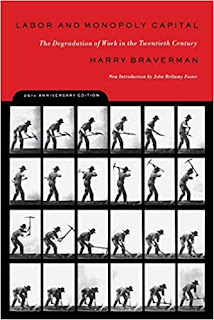Summary of Chapter 5: The Primary Effects of Scientific Management
Braverman expands on the effects of scientific management covered in the previous chapter. Some interesting hauntological imagery, with the paper shadow world that mimics and supplants that of real labor. The paper shadow world is equally important for production, and this perhaps gives it an agency-stealing effect [this is my thoughts on how it links to the uber-hauntology piece]. Taylor is quoted objecting to the idea that his system turns worker into "an automaton, a wooden man."
Braverman does not use this terminology, but he talks about how Taylor's defense of the up-skilling of his system (workers move up a ladder, and new workers come in at the bottom) is really about formal subsumption masking real subsumption, and in fact scientific management practices move up, degrading and controlling workers higher and higher up the hierarchy, including white collar. He emphasizes the growing gulf between science and labor, and notes the ties that used to exist between labor and science. He shows how craft journals were critical of this process as it was happening, and their critique of Taylorism. Implicit, perhaps, is the idea that such organic critique is made less possible as the conditions change and labor becomes less and less skilled. Newer workers are unaware of the skills, etc. that preceded their entry: they are not aware of what has been lost [highly relevant to “sharing economy” app workers].

No comments:
Post a Comment